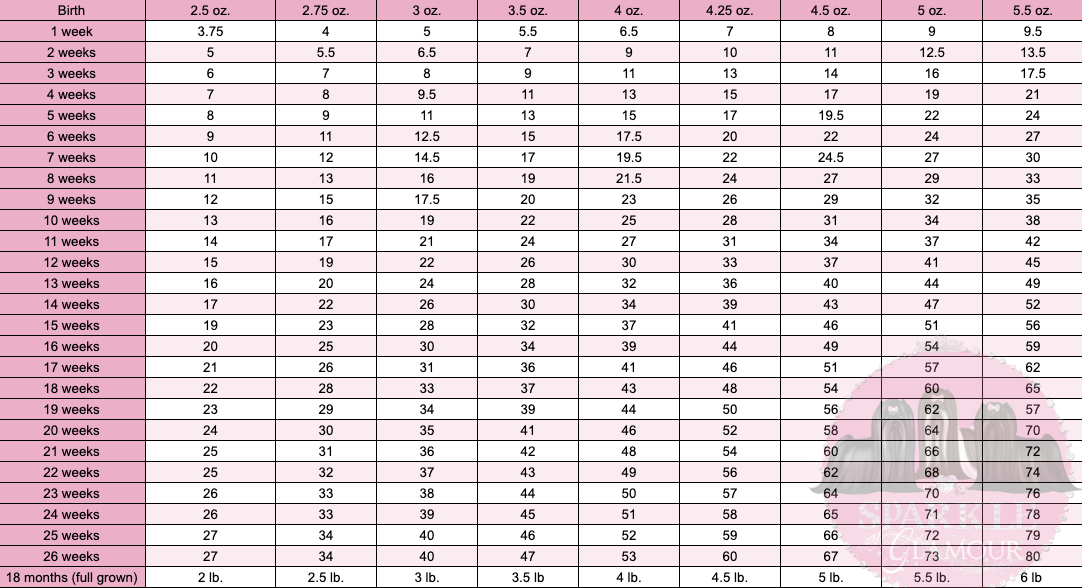
Understanding the growth pattern of your Yorkshire Terrier is essential for ensuring they develop into healthy, happy adults. Whether you’re a proud new Yorkie owner or a breeder, tracking your puppy’s weight using a Yorkie growth chart can help you estimate their adult size and monitor their progress. Below, we’ll discuss the average size of Yorkie puppies at various stages and the factors that influence their growth.
Average Size of Yorkie Puppies by Age
Yorkies are a small breed, but they grow quickly during their first year. Here’s a breakdown of their typical size at different stages:
- Birth to 2 Weeks: Yorkie puppies weigh around 2 to 5 ounces at birth. During the first two weeks, they experience rapid growth, often doubling their size.
- 3 to 4 Weeks: By the end of the first month, Yorkie puppies generally weigh between 10 to 15 ounces. Their eyes open, and they start exploring their surroundings.
- 8 Weeks: At 8 weeks old, Yorkie puppies weigh approximately 1.5 to 2.5 pounds. This is typically the age when they are ready to be placed in new homes.
- 12 Weeks: By 12 weeks, your Yorkie will weigh between 2 and 3.5 pounds as they continue to develop and show their unique personality traits.
- 6 Months: Around 6 months, most Yorkie puppies will be close to their adult weight, usually between 3 to 5 pounds.
- 12 Months (Full Grown): By one year of age, Yorkies reach their full-grown size, averaging between 4 and 7 pounds. Some Yorkies may weigh less, commonly known as “teacup Yorkies,” though this is not an official term.
For those curious about estimating their puppy’s adult size, our Yorkie weight calculator can provide a helpful guide by using their current weight and growth pattern.
Factors That Influence Yorkie Size
Several factors can influence the final size of your Yorkie. Here’s what to keep in mind:
- Genetics: One of the most important determinants of your Yorkie’s size is their genetics. The size of the puppy’s parents will give you a good indication of how big they might become.
- Nutrition: Providing high-quality, nutrient-rich food is essential to support your Yorkie’s healthy growth. Small breed puppy formulas are ideal to ensure they receive the right balance of nutrients.
- Health Conditions: Conditions like hypoglycemia, which is common in smaller breeds, can affect your Yorkie’s growth. Regular vet visits can help prevent or manage any health issues that might arise.
- Exercise: Even though Yorkies are small, they still need regular exercise to promote healthy muscle development and overall well-being. Ensure your puppy gets daily walks and playtime.
Yorkie Weight Calculator: Estimate Your Puppy’s Adult Size
If you want to estimate your Yorkie puppy’s future weight, our Yorkie weight calculator can be a valuable tool. By inputting your puppy’s current weight, you can get an estimate of their expected adult size. Typically, multiplying the puppy’s weight at 8 weeks by 3 provides a rough estimate of their full-grown weight, though individual results may vary.
Tips for Ensuring Healthy Yorkie Growth
To make sure your Yorkie grows up healthy and strong, follow these key tips:
- Feed a Balanced Diet: Choose a high-quality food formulated for small breed puppies. Consult your vet to ensure you’re providing the best nutrition for their size and stage of life.
- Schedule Regular Vet Visits: Monitoring your puppy’s health through regular check-ups is crucial for detecting any issues early and ensuring their growth stays on track.
- Exercise Regularly: Even small dogs need daily exercise to stay fit and avoid becoming overweight, which could lead to health problems later in life.
By understanding how a Yorkie grows and the factors that influence their size, you can help ensure your puppy reaches their full potential. Use our Yorkie weight calculator and growth chart to track your puppy’s development and give them the care they need to thrive.
